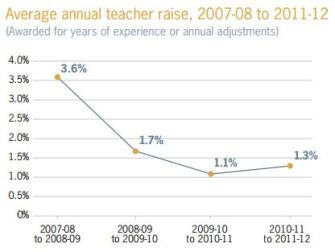This post originally appeared on Education Week Teacher‘s Teaching Now blog.
While teacher salaries continued to increase on average during the recent economic downturn, they did so at a much slower pace, according to a new study from the Washington-based National Council on Teacher Quality.
The NCTQ study was based on salary schedules from 2007-08 (when the recession began) to 2011-12 for 41 of the 50 largest public school districts in the United States. In analyzing the data, NCTQ looked at annual adjustments and step increases for accumulating a year of experience. (The analysis did not include increases for earning advanced degrees or credit hours.)
Between 2007-08 and 2008-09, the study found, teachers received an average 3.6 percent pay increase. However, over the next three years, raises totaled between one-half and one-third that amount. The average pay raise hit a low point of 1.1 percent between 2009-10 and 2010-11, as indicated in this chart from the report.

Districts were most likely to cut or freeze annual adjustments as a means of reducing raises, NCTQ explains in the report, with about three-quarters of districts doing so.
NCTQ also found that teachers in 80 percent of the districts experienced a cut or freeze in total pay at least once over the four-year period. From 2007-08 to 2008-09, 88 percent of districts raised teacher pay and 12 percent froze pay. Two years later, 49 percent of districts raised teacher pay, 37 percent froze pay, and 15 percent made cuts.
Only two of the 41 districts had a net decrease in teacher pay over the four years—Dekalb County, Ga., and Albuquerque, N.M. Just eight districts had an increase in pay each year—Fort Worth, Texas; Memphis, Tenn.; Milwaukee, Wisc.; New York City; Jefferson County, Ky.; Fresno, Calif.; Chicago; and Baltimore City, Md.—.
Interestingly, the district that reported the highest pay raise over this period was Chicago, at 6.5 percent. As our readers remember, Chicago teachers went on strike in September 2012 over a variety of issues, including a revoked 4 percent salary increase. The agreement between the union and the district that ended the strike included a 3 percent salary increase (for the first year, and 2 percent for the next two years), in addition to increases for experience and advanced credentials.
The NCTQ report notes that “teachers’ raise reductions were on par with almost all of the comparable professions we examined. Architects, accountants, and mechanical engineers were harder hit than teachers, but not significantly so.”
For the district-specific findings, see the entire report here.
